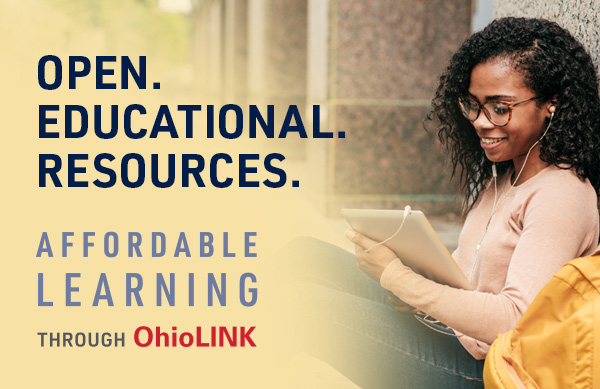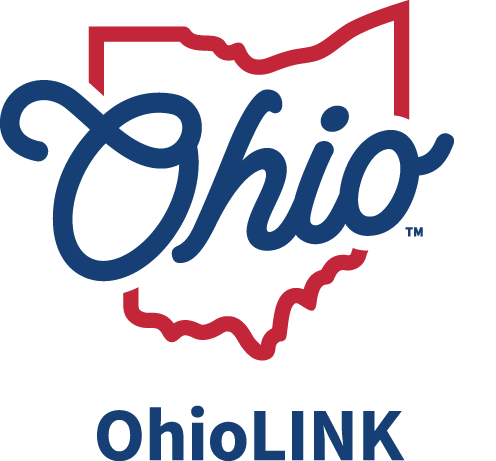OhioLINK Interlibrary Loan Policy
Approved by OhioLINK Intercampus Services Committee (ICS) and the Library Advisory Council (LAC) on July 26, 2024
Approved by Intercampus Services Committee (ICS) on November 19, 1998 to replace "OhioLINK Interlibrary Loan Policies, Effective July 1, 1993" and "OhioLINK Interlibrary Loan Rush Fax & ILL Procedures" dated 9/26/96. Revised 2010, 2012, 2016, and 2024.
1.0 GENERAL
1.1 Eligibility: All OhioLINK member libraries agree to provide reciprocal interlibrary loan service (i.e., the supply of loans or copies of requested materials) to other OhioLINK member libraries and SearchOhio partner libraries without charge. This agreement applies to all types of materials loaned or copied which are not requestable through the shared catalog and is based upon the discretion of library policies or exceptions granted for a one-time usage. Reciprocity begins when a new member library goes "live" in the shared catalog.
1.2 Requests: If possible, all requests should include a complete bibliographic citation. Requests should be initiated electronically through an ILL messaging system (e.g., OCLC or DOCLINE). Other submission forms such as email, web submission, or ALA ILL Request Form may be substituted. The requesting library must indicate OhioLINK membership on the request.
1.3 Turnaround Time: Every effort should be made to respond to all OhioLINK requests within two business days.
1.4 Charges: OhioLINK libraries do not charge each other service, overdue, or rush fees for interlibrary loan requests.
1.5 Rush Requests: Rush requests should only be made when user need is time sensitive. “Rush request” should be stated clearly on the electronic ILL form, email, web submission, or ALA ILL request form. No additional rush charges will be assessed to a member library.
1.6 Other: The Interlibrary Loan Code for the United States with Explanatory Text shall regulate any matters not explicitly addressed within this OhioLINK Interlibrary Loan Policy.
2.0 LOANS
2.1 Shared Catalog: Materials available and requestable via the OhioLINK shared catalog should not be requested via interlibrary loan. Lenders should send a conditional message directing the borrower to send their request through the shared catalog. If extenuating circumstances require the request be made through interlibrary loan, an explanation should be included in the borrowing note field.
2.2 Formats: For materials not available through the shared catalog, OhioLINK libraries are encouraged to lend to each other as liberally as possible through interlibrary loan, regardless of the format of the material requested, while retaining the right to determine what material will be supplied on a case by case basis. Supplying libraries are encouraged to lend audiovisual material, microformats, serials, and other categories of material that have traditionally been non-circulating, and are encouraged to turn off deflections for OhioLINK libraries.
2.3 Loan Conditions: If special usage or shipping requirements apply, the lending library should communicate such terms via a conditional response prior to filling the request.
2.4 Delivery: Loan requests filled through interlibrary loan rather than the shared catalog should be labeled and shipped via the OhioLINK courier system unless otherwise indicated by the lending library.
2.5 Non-Courier OhioLINK Sites: Materials shipped to branch, department, or regional campus locations that are not OhioLINK delivery sites should be sent to the institution’s primary location for forwarding.
2.6 Replacement Charges: Replacement charges are not defined by this agreement. Lending libraries may set their own repair or replacement fees for items damaged or lost through interlibrary loan. Borrowing libraries will promptly pay the lender’s fees for lost or damaged materials.
3.0 COPIES
3.1 Fulfillment of Requests: Requests should be filled electronically (e.g., Odyssey or Article Exchange). If necessary, copy requests may be delivered via email as a PDF attachment or with a link to a locally mounted PDF.
3.2 License Agreements: OhioLINK libraries must comply with all local license agreements when providing copies of electronic content. For OhioLINK-subscribed e-journal and e-book collection content, license information affecting ILL operations can be found on the OhioLINK Staff Information web site (Ostaff login required) under Electronic Journals.
3.3 Accessibility: Libraries have the right to reproduce copyrighted materials in accessible formats for the exclusive, individual use of eligible persons with disabilities per section 121 (the Chafee Amendment) of U.S. copyright law (Title 17, USC). Requesting libraries should communicate in a borrowing note any requirements for a specific user's accessibility needs.
3.4 Scanning Standards: See Appendix.
APPENDIX
OhioLINK Scanning Standards
For Filling Article/Chapter Requests from Print Materials
OhioLINK member libraries observe the following scanning standards in order to enhance user satisfaction, provide consistency across our article/chapter delivery operations, lower barriers to sharing our collections, and follow all provisions of U.S. Copyright Law. These standards apply to normal production scanning in the fulfillment of interlibrary loan copy requests for an individual user. Archival quality standards beyond those listed below will apply if requested materials are digitized for preservation, reformatting, and/or long-term online repository storage purposes.
1.0 APPEARANCE
1.1 Scan at 300dpi unless the requesting library asks for a higher resolution.
1.2 Provide copies that closely replicate the original article or chapter in color and clarity. Use black-and-white, grayscale, or color settings as appropriate to accurately reproduce page images and text.
1.3 Scan all articles/chapters at one physical page per scan; do not include two pages per scan. For special circumstances, see Appendix 3.3a.
1.4 Rotate page images right-side-up (i.e. most often a portrait orientation) before sending unless text is not rotated in the original source.
1.5 Deskew pages that appear off-kilter in order to straighten text that did not scan horizontally.
1.6 Crop overly wide black edges or margins before delivering a scan to decrease file size and improve appearance.
1.7 Avoid dark shading (e.g., from the book gutter) that obscures text or images, as well as ink that bleeds through from a next page, by adjusting threshold settings in the scanner interface or scanning in grayscale or color.
2.0 COMPLETENESS
2.1 Read the Borrowing Notes on all requests for any special instructions. Cancel the request if unable to comply or conditional to offer alternatives for the requesting library to consider.
2.2 Begin each scan with a pull slip that includes citation information and this copyright statement: “Notice: This material may be protected by Copyright Law (Title 17 U.S.C.).”
2.3 Begin each book scan with the title page and verso/copyright page before the requested chapter.
2.4 Be careful not to miss or cut off pages when scanning.
2.5 For oversized items:
- Scan the top and then bottom halves of the page for really large pages; or
- Shrink the page size to an 8.5”x11” area for slightly larger pages if text can still be read.
2.6 Include a whole article or chapter even if only a first page number is indicated, unless the
requestor specifies only a particular page. Be sure to include accompanying references, plates, endnotes, appendices, or supplementary material that are part of an article/chapter.
2.7 For items NOT in the public domain:
- Scan one chapter per book or one article per journal issue per request in accordance with Section 108 of U.S. Copyright Law.
- Avoid arbitrary limits on the number of pages to be scanned per transaction, and instead apply Section 108 and 107 (Fair Use) provisions of U.S. Copyright Law.
- Apply Section 108(h) provisions of U.S. Copyright Law for scanning entire published works that are in the last 20 years of their copyright term.
- Apply Section 121 of U.S. Copyright Law to scan an entire work, only if the requesting library denotes the copy is for the exclusive use of an eligible person with a disability. The supplying library can provide the whole-work scan themselves or conditional to offer a loan if unable to fill the request in a timely manner so that the requesting library may perform the scan.
- Conditional if the request is likely beyond Fair Use. Offer the requesting library a loan instead of a scan and secure their permission before sending.
2.8 For items that ARE in the public domain:
- Scan entire works as staffing permits.
- Conditional for more time if needed.
2.9 If a file is very large (e.g., excessive page length or multiple color/grayscale images):
- Save the file as a Reduced Size PDF in order to deliver it via a document delivery system such as Odyssey or Article Exchange; or
- Mount the file on a local server and email a link to the requesting library; or
- Zip the file and send it as an email attachment.
3.0 TIMELINESS
3.1 Scan requests should be filled within two business days whenever possible.
3.2 Resend requests should be filled within one business day whenever possible.
3.3 If unable to fill scan requests promptly or as requested (e.g., due to limited staffing or time needed to retrieve from remote storage), consider:
- Conditionalizing the request to explain circumstances or request more time; or
- Canceling the request to let another library fill more quickly; or
- Changing your OCLC Days to Respond to a higher number of days so that requesting libraries can place you in a lower tier custom holdings group; or
- Creating a temporary deflection for copy requests in the OCLC Policies Directory; or
- Going to non-supplier status in your document delivery system (e.g., OCLC or DOCLINE).
Adopted for OhioLINK from The Ohio State University Libraries and the Big Ten Academic Alliance

